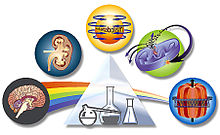Divisions
Clinical pharmacology
Neuropharmacology
Psychopharmacology
Cardiovascular pharmacology
Pharmacogenetics
Pharmacogenomics
Pharmacoepidemiology
Safety pharmacology
Systems pharmacology
Toxicology
Theoretical pharmacology
Posology
Environmental pharmacology
Experimental pharmacology
Dental pharmacology
Scientific background
- Liberation – How is the API disintegrated (for solid oral forms (breaking down into smaller particles)), dispersed, or dissolved from the medication?
- Absorption – How is the API absorbed (through the skin, the intestine, the oral mucosa)?
- Distribution – How does the API spread through the organism?
- Metabolism – Is the API converted chemically inside the body, and into which substances. Are these active (as well)? Could they be toxic?
- Excretion – How is the API excreted (through the bile, urine, breath, skin)?
Medicine development and safety testing
Drug legislation and safety
Education
Etymology
See also
- Certain safety factor
- Cosmeceuticals
- Crude drugs
- Nicholas Culpeper – 17th century English Physician who translated and used 'pharmacological texts'.
- Drug design
- Drug Discovery Hit to Lead
- Drug metabolism
- Enzyme inhibitors
- Herbalism
- History of pharmacy
- International Union of Basic and Clinical Pharmacology
- Inverse benefit law
- List of abbreviations used in medical prescriptions
- List of pharmaceutical companies
- List of withdrawn drugs
- Loewe additivity
- Medical School
- Medicare Part D – the new prescription drug plan in the U.S.
- Medication
- Medicinal chemistry
- Neuropharmacology – The Molecular and Behavior study of Disease and Drugs in the Nervous System
- Neuropsychopharmacology – The detailed comprehensive study of mind, brain and drugs.
- Pharmaceutical company
- Pharmaceutical formulation
- Pharmaceuticals and personal care products in the environment
- Pharmacognosy
- Pharmacopoeia
- Pharmacotherapy
- Pharmakos
- Placebo (origins of technical term)
- Prescription drug
- Prescription Drug Marketing Act (PDMA)
- Psychopharmacology – medication for mental conditions
- Toxicology
- Traditional Chinese Medicine
- Pharmacology
- Definition
- Pharmacology is a branch of biomedical science, encompassing clinical pharmacology, that is concerned with the effects of drugs/pharmaceuticals and other xenobiotics on living systems, as well as their development and chemical properties.
NEWSLETTER
Medical Definition of Pharmacology
Pharmacology: The study of drugs, their sources, their nature, and their properties. Pharmacology is the study of the body's reaction to drugs. It emerged as a major area in American medicine largely due to the efforts of John Jacob Abel (1857- 1938) who stressed the importance of chemistry in medicine, did research on the endocrine glands, first isolated epinephrine (adrenaline), crystallized insulin (1926), and became the first pharmacology professor in the U.S.


Comments
Post a Comment
Here all information related to medical and doctoral health is published. Visit any of these languages in your language to see your language.